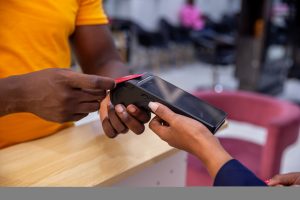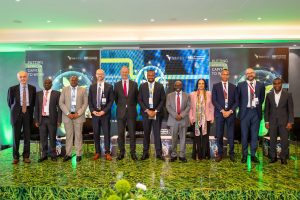Over the last few years there has been growing criticism about banks’ inability to spearhead innovations to meet emerging market needs. This may be partly true due to the high unbanked population in Sub-Saharan Africa and the cost to serve. Often, banks have innovative ideas, but need technical assistance to be able to build capacity for idea generation, prototyping and commercialization. As a result of this, banks are collaborating with like-minded partners to help them innovate and to remain competitive in their markets.
In 2013, Fidelity Bank Ghana Limited (FBGL) saw the gap in financial services for the large unbanked population and was the first bank in Ghana to set up a dedicated unit to drive its Financial Inclusion agenda. The bank sought approval from Bank of Ghana to launch a low KYC account named Smart Account and the first bank led Agent network. The Smart Account opened via mobile app with just one National ID, made it easy anyone to open a bank account whilst the Agent network se as an alternative low cost and effective channel to include largely unbanked and underserved rural populations. FBGL sold its vision to FSD Africa, and due to an alignment of objectives, FSD Africa agreed to support the project. Dubbed “Project 5x5x5”, FBGL aims to open 5 million accounts in 5 years through 5,000 agents.
The Project 5x5x5 started in earnest in 2015 with a sales force for recruiting agents and acquiring customers. This was a welcome change for the unbanked and underbanked in Ghana, which led to Smart Account winning an award for Best Bank in Product Innovation at the Ghana Banking Awards. Due to unprecedented challenges, the project slowed down for several months to enable the technical teams from both institutions review some of the critical aspects on which the project deliverables depended. FBGL on its part was aware of the market backlash in response to withdrawal or slowed services but managed to counter this through by stepping up communication with its customers to allay any fea the market.
We are now happy to say that the project is back on track. A total of 2,600 Agents have been enrolled and over 790,000 Smart accounts opened. The split between male and female customers is at 49% and 51% respectively which is very impressive given the sub-Saharan context where female inclusion lags behind men at 23%. The bank’s capacity to serve the underserved segment has been strengthened and internal reorganization of key departments within the Retail division and training of staff critical to the delivery of the project as well as the users, reinforced.
The bank has seen the value of Agency banking which is no longer viewed as a stand-alone project but one that has been mainstreamed into the bank’s business-as-usual processes. Agency banking is no longer a channel for inclusive-banking customers but has evolved into a channel that serves all banking segments unlocking a lot more value for the bank than initially envisaged. Additionally, the project has had to adapt to the changing ecom majorly influenced by digital innovations. Towards this, the bank has developed digital channels in partnership with Telcos which has enabled the roll out of digital savings and credit products. Soon customers will be able to open accounts on their mobile phones (self-onboarding) and access digital credit via USSD.
The success of this project relies on the close collaboration of FBGL and FSD Africa, and important lessons have emerged from this. Close working relationships are critical to project management in that they enable for candid discussions on performance leading to quick interventions where needed. In addition, being aware of the changing financial ecosystem has enabled the project to incorporate critical work-streams, like digital add-ons that were initially not part of the project, but critical to maintaining the bank’s relevance in the marketplace.
Although there were setbacks in the early stages of the project that could have easily discouraged the teams, FGBL had made a strategic decision reach the lower income segments through the Smart Account with a simplified way of account opening using a sales force, agents and bank branches. , This long-term vision fortified the determination to find solutions to emerging challenges. FSD Africa has been adaptable to emerging dynamics that have necessitated changes at various stages of the project. This is in line with its objective of incentivising financial institutions to innovate by availing the necessary technical assistance and supporting partners to iterate for optimal delivery of the projects.
This project is a clear demonstration of managing projects for results, and partners working together to overcome emerging challenges as they strive towards achieving the bigger goal. The project is on course to deliver the ambitious 5x5x5 objective with visible market system changes. Already, the Ghanaian market is responding positively to this innovation, as two banks have since launched Agency banking networks. FSD Africa is glad to have supported FBGL to set the pace in Ghana, and their financial landscape is permanently changed.,




